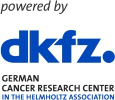Description
Variants of unknown significance represent the biggest challenge for genomics-based precision oncology making high throughput functional genomics essential to characterize them. Aberrantly activated Fibroblast Growth Factor Receptors (FGFRs) frequently drive tumorigenesis across many tumor entities. Approved selective inhibitors (FGFRis) are available. However, it remains largely unknown which of the many different FGFR point mutations are druggable, i.e. activating signaling while not mediating resistance thereby substantially limiting the therapeutic potential of approved FGFRis.
We implemented a saturation mutational scanning platform to screen all 29259 possible point mutations in FGFR1-4. In positive selection screens of the kinase domains, we already identified 474 activating and 738 resistance-mediating mutations to the FGFRis pemigatinib or futibatinib yielding 301 druggable point mutations with a strong PS3/BS3 evidence level. Mutations in the same codon could strongly differ in their impact, underlining the necessity for a saturation approach. Importantly, our functional screens identified 97% of acquired resistance mutations in a clinical trial.
In summary, we provide a comprehensive and clinically highly relevant catalog of every single druggable point mutations in FGFR which is readily available for clinical decision support.
For the future, we see the necessity to expand our dataset to the regions outside of the kinase domain, to include the third FGFR inhibitor approved in Germany, erdafitinib, as well as to develop and test a second, independent activation model to allow robust predictions of the activation and drug response impact to enable a planned clinical trial to test FGFRi treatment for tumors with FGFR point mutations.
| Preferred type of presentation |
|---|

